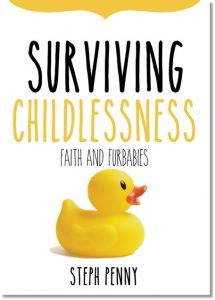Today it’s my pleasure to welcome author Steph Penny, to the blog. (And be sure to read to the end for your chance to win a copy of Steph’s latest book.) Thanks for joining us, Steph.
Thanks Nola, it’s a pleasure to be here!
The Story Behind the Book
You’ve recently released your book ‘Surviving Childlessness: Faith and Furbabies’. Could you tell us a little about yourself and what prompted you to write the book?
It was actually prompted by a number of childless friends, who approached me separately and asked me to write a book about marriage. My first thought was, ‘Ugh!’ followed by, ‘No way!’ There are already tonnes of books out there on marriage. But then one friend said, ‘Steph, don’t write about marriage. Write about what it’s like to be married in church and not have any children.’ And I thought: ‘Yes. I can do that.’

So I started writing the book, but it was during my online research that my own childless journey took a terrible turn. I discovered that getting pregnant for me—as a person living with chronic illnesses—would be highly risky, both for myself and for the baby. So my husband and I made a difficult decision to remain childless. I refer to this as childlessness-by-forced-choice, because even though we made that choice, we felt there was no other choice for us. We were backed into a corner by terrifying medical risk.

I put my story into the book but didn’t want to write about my childless journey alone. I was acutely aware that my childless story was unusual, even within the childless community. So I invited others to contribute. I put a tiny advert on social media one night, and the following morning I awoke to a tsunami of replies! In the end, I interviewed 14 people about their childlessness and included their stories in my book. I hope readers will find stories with which they resonate and will realise they are not alone.
Reasons for Childlessness
That must have been a very difficult decision for you and your husband to make. Some people may make a conscious decision to remain childless, but as you’ve mentioned, the choice is sometimes taken out of their hands. What were some of the other reasons for childlessness that you came across in your research?
Yes, there are many reasons why people are childless-not-by-choice! The most common reasons I found were infertility and miscarriage, but there are heaps of others: not being able to find the right partner, finding a partner but being too old to have children, early menopause, endometriosis, past trauma, having a criminal history, having a low sperm count, divorce, losing a partner through death, finding out your partner is homosexual, becoming single, being rejected by adoption and foster care agencies, prioritising study or careers, not knowing that ageing is correlated with decreased fertility, Pink’s disease (mercury poisoning) and unsuccessful IVF attempts.
And there are legitimate reasons why people may feel forced into a childless situation (apart from illness like me), such as having a disability or mental health issue, abortion, living with substance use or domestic violence in the home, problems with having sex, worries about one’s parenting capacity and having ethical and spiritual issues with IVF. Not to mention valuing other things over potential children. Some people in my book actually opted out of treatments like surgery and IVF because they were concerned about the impact on their relationship and their faith.
Stereotypes and Stigma
Wow, that’s certainly a myriad of reasons. Although childlessness is common, those without children are often stereotyped in our society. Could you expand on that a little?
Absolutely! Even though childlessness is currently on the rise, childless people are frequently excluded and even mocked for being childless. There is an expectation that people, women in particular, will become baby-making machines the instant they find a partner. I have encountered such expectations myself, particularly in the church and even working as a psychologist. People are surprised and even shocked to discover a psychologist does not have children. I guess I missed that criterion on my job description.
People assume childless women are career-driven, selfish, or ‘crazy cat lady’ types of mutants. And men do not get out jail free either: some childless men worry they are perceived as paedophiles.
It’s like society looks at us and goes: ‘Hmm, there must be a reason why they are childless.’ Like we are social lepers or psychopaths!
It doesn’t stop there. We don’t get the work/life balance afforded to parents. We can’t contribute to baby-related conversations. Sometimes we don’t get a say in anything. Society believes childless people are unwilling to invest in the next generation or in the future of our planet, therefore we cannot represent the average Australian (because, apparently, the average Australian is a parent).
And it’s not just paranoia. Professor Renske Keizer found childless people are perceived by society as being less well-adjusted, less nurturing, more selfish and more career-oriented. The stigma is real. Or the stigma goes the other way, with assumptions that childless people are happy-go-lucky, sleeping in all the time and partying their lives away. I have been told I’m lucky for not having kids!
Church Community as a Help or Hindrance?
For those with a Christian faith, the church community should be a great support to those who are childless. However, as you’ve alluded to, it doesn’t always work out that way. Could you tell us a bit about that?

Sure, I have good, bad and ugly stories about how churches have responded to childless people! Some churches are wonderful at supporting their childless members. They are inclusive and welcoming, and they are intentional about helping outsiders feel ‘inside’.
But, unfortunately, other churches are terrible at this. They focus on kids and young people, worthy ministries per se, but it occurs at the expense of everyone else. They run parenting programs, their women’s ministry is geared toward mothers and homemakers and their men’s ministry focuses on fathering. And don’t even get me started on the glorification of parents (otherwise known as Mother’s and Father’s Days and ‘Parenthood is the greatest gift’ sermons).
Some of my interviewees were badly hurt by the church. They were told it’s God’s will they are childless, as though God has deemed them to be an unfit parent. They have been fed false hope through prophecies that have not come true or through the repeated sharing of biblical miracle-baby stories (like Sarah and Abraham). They have endured ‘You’ll never know God’s love until you have a child’ messages from other Christians.
It was my own bad church experiences that fuelled my fire for this book. I was told by one pastor I was ‘in sin’ for not wanting or having children. Shocking, but true. Another time, I was at a church event where a group gave childless people a verbal bashing, chorusing that childless people ‘have no idea what it’s like to be a parent’! (Read my book to find out how I responded to that one!)
The church can do much to support childless people. They can invite them over for a meal and include them in their lives. Preachers can mention childless people in their sermons about suffering and hardship, not just parenting challenges. They can talk about God—not us—on Mother’s and Father’s Days, expounding the wonderful fatherly and motherly traits of our Heavenly Father.
The church community can be understanding when childless members do not attend the more ‘family-friendly’ events and check in with them afterwards. Treated this way, childless people will feel loved and remembered and valued.
Practical Suggestions
What advice would you give to someone who wants (or wanted) children but remains childless?
My first response is not to give advice, because most childless people have already had a gutful from doctors, friends, family and society in general! But I do have some ideas and suggestions. First of all, don’t lose your sense of humour. We have plenty of opportunities to find the silly or absurd in childlessness, everything from ‘Doing it in a cup is super sexy’ to ‘If you show me your baby photos, I will share hundreds of my cat photos with you’!
Second, cut yourself some slack. Grief is unpredictable, so do what you need to care for yourself. That includes getting support, finding other childless people (because solidarity is vital), going to a counsellor and keeping things honest with your partner (if you have one). Practising gratitude can help with the grieving process. Looking for silver linings does not cure our heartache, nor does it compensate for childlessness, but it can help shift our perspective a little. Some days, that might be enough.
Third, get yourself a furbaby! My little furbaby has helped me and some of my interviewees said their furbabies help fill the void left by childlessness.
If furbabies are not for you, consider pouring your parenting instincts into others, perhaps through volunteering or teaching or mentoring. Find alternative ways of parenting without being a parent or, as I call it, non-parenting parenting!
Finally, we all need a reason to live. Find your passion and pursue that. It could be almost anything: travel, sport, music, writing (as it is for me), helping other childless people, giving back to your community, ministry and so on. Find that thing that gets you out of bed in the morning. That’s your anchor in the sea of childlessness.
Your anchor could be faith. If your relationship with God has been hurt by childlessness (which does happen), you may find little parts of your faith survive the shipwreck, even if those parts look somewhat different.

Perhaps you listen to death metal worship instead of ballads. Perhaps you visit another church or watch church online. Perhaps you pray a little more frankly than you did before. Find your faith anchor, even if you have walked away from God or feel he has walked away from you. God is deeply concerned with those things that deeply concern us, and he shares our sorrows. He is super patient and he will wait for you. Even when hope has died, there is hope for reconciliation with God.
Giveaway
Thanks so much, Steph. I’m sure your book will help many people.
Steph has kindly made available an autographed copy of Surviving Childlessness: Faith and Furbabies for one lucky reader. In order to enter the draw for the prize, just add a comment below by midnight on Sunday 20 June 2021 (Australian Eastern Standard Time). The winner will be chosen at random from the eligible comments, and their name will be published in the comments section of this blog post, in my next newsletter and on the Nola Lorraine Facebook page. As the prize is a print book, this giveaway is only available for those with an Australian postal address. (Stay tuned for other giveaways in the future that will be open to anyone.) For full terms, please click here.
Author Bio

Steph Penny is an author and blogger of Christian living issues, including singledom, childlessness, chronic illness, worship and counterculturalism. Surviving Childlessness is her second book in the Survival Series, following her debut book, Surviving Singledom. Steph’s blogs can be found at: www.stephpenny.com.au
In her spare time, Steph works as a psychologist, writes and publishes original songs on YouTube, sings and plays keyboard for her local church, and hangs out with her husband and feline furbaby, a rescue cat names Portia.
Social Media Links
Website: www.stephpenny.com.au
Facebook: https://www.facebook.com/StephPennyAuthor
Twitter: https://twitter.com/StephPenny1
Email: steph@stephpenny.com.au
Buy Links
Surviving Childlessness: Faith and Furbabies is available from:
Steph’s website: stephpenny.com.au
Photo Credits
Author photos and book cover courtesy of Steph Penny. Anchor photo by Nola Lorraine. All others as marked.







14 Responses
Thank you for sharing about your journey, Steph. Your book gives an insight into how we never know what someone else is walking through.
Well done for tackling this topic and for all those who shared very real experiences. The honesty and vulnerability will help others navigate their own journey and also highlight the ways we can can all be more understanding.
Hi Elaine, thanks for your comments! I really hope this book helps other childless people, and I hope it raises awareness in society too. This subject can be tricky to talk and hear about, but I think it’s important that we do. We can all do with a little more understanding!
Yep I can identify. I was single until I was 43 then when I finally did marry my ovaries said, “Yikes, we’re outta here!” Lol, I could give you some church stories. Great idea for a book, Steph. Furbabies do help too :).
Hi Susan, haha on the talking ovaries! I would love to hear about your church experiences, good or bad. It’s so important to get that support, whether that comes in the form of church or pets!
Great interview Nola! Love your courage and willingness to share your story Steph!! I will definitely be recommending your book after I’ve read it myself of course. And I’ll be recommending it to our church library too.
I know there are many who share your heartache and experiences who will appreciate you sharing you story and the stories of others going down this road
God bless!
Thanks Kaye! Yes, there are many others like me, who share stories of grief and loss, but also of survival and healing. Our stories definitely help one another and that makes them worth sharing. And thanks for your kind offer to recommend my book to others!
Wow! Steph! What a huge niche your book can fill!
I have two dear relatives who are childless. One by choice as she had a spinal fusion early in her marriage due to a broken back, but is in constant debilitating back pain; the second married at 49 so was past child-bearing. Both ladies have beautiful fur-babies they are ‘mummy’ to… and both receive criticisms about their fur-motherhood from another relative who scoffs at the substitute parenthood.
The first one in my examples has at times borne the ‘tap-tap’ of accusing finger-on-wrist chiding, “your clock is ticking”…
Rosemary, I really feel for those two relatives you mentioned, especially the one who gets pressured by others about ‘the clock’. But how horrible for both of them to endure mockery for being furbaby parents! Furbabies can bring so much comfort and meaning to our lives, where previously there may have been none…this is why I wrote a book about these issues! Thanks for sharing.
Great to see your book has made it into the public arena, Steph!
I visited a church once for a special service (which had nothing to do with children) and I was surprised how child orientated it was. Even though I do have children, it did occur to me that a childless person could feel uncomfortable. Later I spoke to someone from my church and they told me they had left that church for that very reason.
Thank you Susan, you have seen what few people in church see: that most of our get-togethers revolve around children, and that childless people get excluded by this. I totally understand why your friend would have left that church! And this is what I hope to bring to light with my book, to raise awareness around pronatalism and how it affects the church, so we can become more inclusive!
Great interview! Yes… “You’re so lucky you don’t have kids… you can have one of mine if you want…. you get to sleep in… that’s why you have money to go on holidays…”. Typical comments said by those who don’t understand.
Right?! Those who are childless do not feel ‘lucky’ in their grief, and telling us so can feel dismissive of our pain. This is why so many childless people feel isolated and excluded from mainstream society. Plus, those of us with furbabies are often denied our sleep-ins!
Hi everyone – Thank you for your comments. Steph’s book has certainly struck a chord. The giveaway has now concluded. The winner of the random draw was Susan J. Bruce. Congratulations, Susan. We’ll be in touch about the prize.
Congratulations Susan! Your free copy of Surviving Childlessness will be shipped soon!